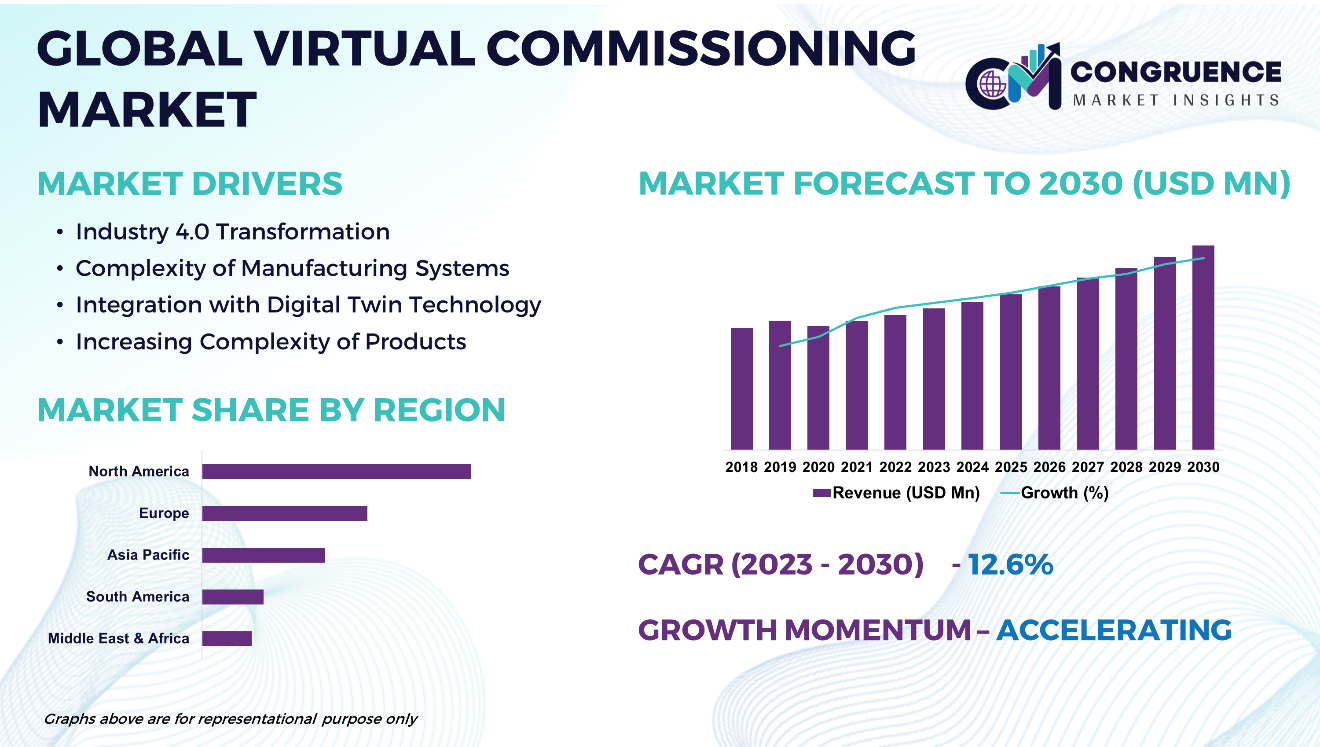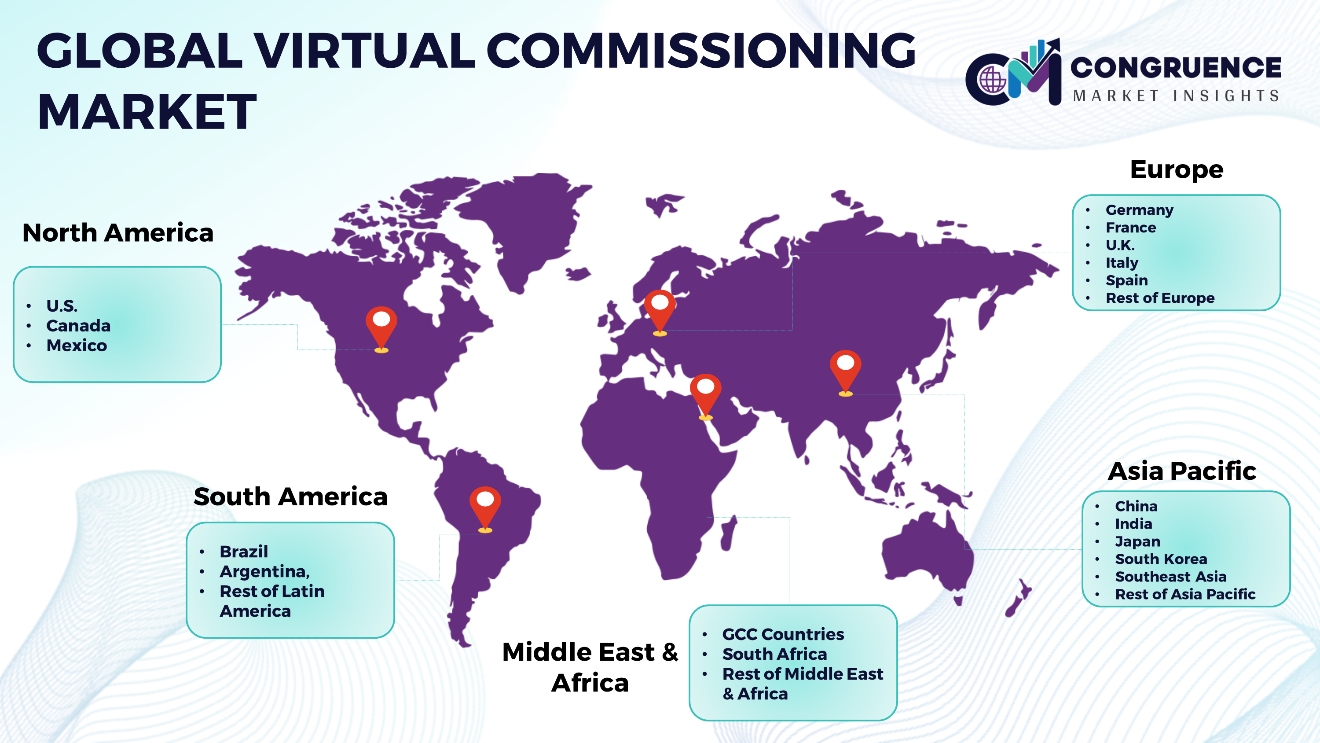Reports
The Global Virtual Commissioning Market is expected to expand at a CAGR of 12.6% between 2023 and 2030. Virtual Commissioning, a pivotal aspect of Industry 4.0, transforms conventional manufacturing methodologies by simulating and refining production lines in a digital realm prior to physical implementation. Integration of 5G networks elevates Virtual Commissioning to unprecedented levels, facilitating instantaneous data exchange and rapid communication between virtual simulations and tangible equipment. This fosters heightened collaboration, reduced time-to-market, and minimized operational downtime. The advantages stemming from augmented networking capabilities encompass enhanced operational efficiency, heightened scalability, and accelerated innovation. Within the market landscape, Virtual Commissioning solutions are witnessing increased adoption across diverse sectors, spanning automotive to pharmaceuticals, as organizations endeavor to optimize processes and adapt to evolving market dynamics.

Virtual Commissioning Market Major Driving Forces
Industry 4.0 Transformation: The ongoing transition towards Industry 4.0 principles drives the demand for Virtual Commissioning solutions. As manufacturers embrace digitalization and automation, Virtual Commissioning emerges as a critical enabler for optimizing production processes, reducing time-to-market, and enhancing operational efficiency.
Complexity of Manufacturing Systems: Modern manufacturing systems are increasingly complex, comprising interconnected machines, robots, and sensors. Virtual Commissioning addresses the challenges associated with system integration, validation, and optimization by providing a simulated environment for testing and fine-tuning production workflows.
Integration with Digital Twin Technology: The integration of Virtual Commissioning with digital twin technology enhances its capabilities for simulating and optimizing manufacturing processes. Digital twins enable real-time monitoring and analysis of production systems, facilitating predictive maintenance, process optimization, and performance improvement.
Increasing Complexity of Products: As products become more sophisticated and customized, manufacturing processes must adapt to accommodate varying requirements and configurations. Virtual Commissioning allows manufacturers to validate production workflows for complex products in a virtual environment, ensuring seamless integration and efficient production.
Virtual Commissioning Market Key Opportunities
Integration with Industry 4.0 Technologies: Virtual Commissioning can be integrated with other Industry 4.0 technologies such as IoT, AI, and cloud computing to create more robust and efficient manufacturing processes. This integration can enhance real-time monitoring, predictive maintenance, and overall operational efficiency.
Expansion into New Industry Verticals: While Virtual Commissioning is traditionally associated with manufacturing, there are opportunities to expand its applications into new industry verticals such as healthcare, energy, and transportation. By adapting virtual commissioning principles to these sectors, stakeholders can unlock new markets and revenue streams.
Development of Customized Solutions: There is a growing demand for customized Virtual Commissioning solutions tailored to the specific needs of different industries and applications. Companies that can develop flexible and scalable solutions to address diverse customer requirements will be well-positioned to capitalize on market opportunities.
Focus on Simulation Accuracy and Realism: Improving the accuracy and realism of virtual simulations is crucial for enhancing the effectiveness of Virtual Commissioning. Advancements in simulation software, modeling techniques, and virtual reality (VR) technologies present opportunities to create more immersive and realistic virtual environments for commissioning activities.
Virtual Commissioning Market Key Trends
· The incorporation of 5G networks into Virtual Commissioning systems facilitates real-time communication, remote monitoring, and faster data transmission, enhancing overall efficiency and effectiveness.
· Digital twins, virtual replicas of physical assets, are increasingly utilized in Virtual Commissioning to simulate and optimize production processes, leading to improved performance, reduced downtime, and enhanced predictive maintenance capabilities.
· Adoption of AI and ML algorithms enables automated optimization of production processes, predictive analytics, and adaptive control strategies, enhancing efficiency and productivity in Virtual Commissioning.
· Cloud-based Virtual Commissioning solutions offer scalability, flexibility, and accessibility advantages, enabling seamless collaboration, data sharing, and remote access to virtual simulation environments.
· Integration with IoT and CPS enables comprehensive monitoring, control, and optimization of manufacturing processes, providing real-time visibility, predictive maintenance, and adaptive control capabilities.

Market Competition Landscape
In the Virtual Commissioning market, competition among industry participants is robust, characterized by a concerted effort to distinguish their respective products and services. Strategies are directed towards technological advancements, the delivery of superior services, and strategic market positioning to secure a competitive edge. With a rising need for virtual simulation solutions spanning various sectors, this competitive landscape propels ongoing enhancements and fosters innovation in Virtual Commissioning methodologies and platforms.
Key players in the global Virtual Commissioning market implement various organic and inorganic strategies to strengthen and improve their market positioning. Prominent players in the market include:
· Siemens
· Rockwell Automation
· Dassault Systèmes
· ABB
· KUKA AG
· Maplesoft
· Cenit
· Heitec AG
· Machineering GmbH
· Lenze
· Xcelgo
· Schneider Electric SE
· Mitsubishi Electric Corporation
· Honeywell International Inc.
· Beckhoff Automation GmbH & Co. KG
· Robert Bosch GmbH
· Hexagon AB
· Lanner Group Ltd. (Royal HaskoningDHV)
· PTC Inc.
· FANUC Corporation
|
Report Attribute/Metric |
Details |
|
Base Year |
2022 |
|
Forecast Period |
2023 – 2030 |
|
Historical Data |
2018 to 2022 |
|
Forecast Unit |
Value (US$ Mn) |
|
Key Report Deliverable |
Revenue Forecast, Growth Trends, Market Dynamics, Segmental Overview, Regional and Country-wise Analysis, Competition Landscape |
|
Segments Covered |
· By Type (Plant and Process Simulation, Robotics and Automation Simulation, and Others) · By Application (Assembly Line Simulation, Manufacturing Process Optimization, Design Validation, and Others) · By End-Use Industry (Aerospace and Defense, Automotive and Transportation, Machine Manufacturing, Energy and Utilities, and Others) |
|
Geographies Covered |
North America: U.S., Canada and Mexico Europe: Germany, France, U.K., Italy, Spain, and Rest of Europe Asia Pacific: China, India, Japan, South Korea, Southeast Asia, and Rest of Asia Pacific South America: Brazil, Argentina, and Rest of Latin America Middle East & Africa: GCC Countries, South Africa, and Rest of Middle East & Africa |
|
Key Players Analyzed |
Siemens, Rockwell Automation, Dassault Systèmes, ABB, KUKA AG, Maplesoft, Cenit, Heitec AG, Machineering GmbH, Lenze, Xcelgo, Schneider Electric SE, Mitsubishi Electric Corporation, Honeywell International Inc., Beckhoff Automation GmbH & Co. KG, Robert Bosch GmbH, Hexagon AB, Lanner Group Ltd. (Royal HaskoningDHV), PTC Inc., and FANUC Corporation |
|
Customization & Pricing |
Available on Request (10% Customization is Free) |
